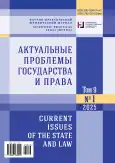Classification of transport crimes: analysis of controversial cases of separation from related offences and administrative responsibility
- Authors: Popova E.A.1, Vanina A.A.2
-
Affiliations:
- Derzhavin Tambov State University
- Department of the Ministry of Justice of the Russian Federation for the Tambov Region
- Issue: Vol 9, No 1 (2025)
- Pages: 111-120
- Section: Current Issues of Criminal Legal Sciences
- URL: https://journal-vniispk.ru/2587-9340/article/view/295222
- ID: 295222
Cite item
Abstract
The article reveals current problems of the qualification of transport crimes, due to their specificity and diversity, which often causes difficulties in law enforcement. Special attention is paid to distinguishing transport crimes from related offences provided for by the Criminal Code of the Russian Federation and administrative offences, the responsibility for which is enshrined in the Code of Administrative Offences of the Russian Federation. In addition, this article analyzes criteria that assist in distinguishing transport crimes from administrative offenses, as well as differentiating between different types of transport crimes. This analysis is based on specific examples illustrating controversial situations related to violations of Traffic Regulations and the rules of operation of various vehicles. Criminalization, which is mentioned in the article, is a process when acts previously considered administrative offenses become criminal offenses. This happens when certain conditions appear that indicate a significant increase in the public danger of such acts. The results of the analysis become the basis for recommendations aimed at improving law enforcement practices and clarifying legislative norms that consolidate responsibility for violations of legislation in the field of vehicle operation. The development and implementation of scientifically based recommendations contributes to the full implementation of the principles of uniformity and fairness in the application of criminal and administrative legislation in the field of the use and operation of vehicles.
About the authors
Elena A. Popova
Derzhavin Tambov State University
Author for correspondence.
Email: elenap2672@yandex.ru
ORCID iD: 0000-0002-6903-1775
Cand. Sci. (Law), Associate Professor, Associate Professor of Criminal Law Disciplines Department of the Institute of Law and National Security
Russian Federation, 33 Internatsionalnaya St., Tambov, 392000, Russian FederationAnna A. Vanina
Department of the Ministry of Justice of the Russian Federation for the Tambov Region
Email: hionia_anna@mail.ru
ORCID iD: 0009-0003-8677-3062
Specialist-Expert of the Department for Non-Profit Organizations
Russian Federation, 142/10 Karl Marx St., Tambov, 392036, Russian FederationReferences
- Kravets I.P. (2016). The road traffic offences delimitation from the related offences legal regulation. Vestnik Volzhskoi gosudarstvennoi akademii vodnogo transporta = Bulletin of the Volga State Academy of Water Transport, no. 46, pp. 227-233. https://elibrary.ru/vpbbwj
- Efarova M.N. (2022). Criminal law characteristics of actions that threaten the safe operation of vehicles. Vestnik Ural’skogo yuridicheskogo instituta MVD Rossii = Bulletin of the Ural Law Institute of the Ministry of the of the Interior of the Russian Federation, no. 1 (33), pp. 164-167. https://elibrary.ru/efbqzp
- Khakimova R.F. (2019). Delineation of traffic offences from offences. Pero nauki = Feather of Science, no. 14 (14), pp. 11-14. https://elibrary.ru/gwwswt
- Baranchikova M.V. (2023). Administrative punishment as a sign of the subject of a traffic crime. Pravoporyadok: istoriya, teoriya, praktika = Legal Order: History, Theory, Practice, no. 4 (39), pp. 52-57. https://doi.org/10.47475/2311-696X-2023-39-4-52-57, https://elibrary.ru/dijnvk
- Afonin V.V. (2021). Article 264.1 of the Criminal Code of the Russian Federation “Violations of traffic rules by a person subjected to administrative punishment”: some problematic aspects. Yurist”-Pravoved” = Lawyer-Jurist, no. 2 (97), pp. 175-178. https://elibrary.ru/yawxrd
- Nepomnyashchaya T.V., Savin S.V. (2015). Commission of a crime in the state of alcohol intoxication as an aggravating circumstance for punishment. Ugolovnoe pravo = Criminal Law, no. 6, pp. 36-39. https://elibrary.ru/vgmhax
- Popova Yu.P. (2021). How the new edition of Article 267 of the Criminal Code of the Russian Federation will affect the qualification of offenses. Transportnoe pravo i bezopasnost’ = Transport Law and Security, no. 1 (37), pp. 82-90. https://elibrary.ru/mdvoit
- Boronina V.S. (2022). Collisions of administrative legislation on road safety in the Russian Federation. Vestnik Tomskogo gosudarstvennogo universiteta = Tomsk State University Journal, no. 483, pp. 221-226. https://doi.org/10.17223/15617793/483/24, https://elibrary.ru/xswsyc
Supplementary files








